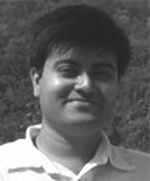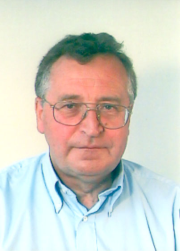
|

|
Invited Speakers

|
Dr.Golam Ashraf National University of Singapore School of Computing Computing Drive 117417 Singapore  Tel: +65.651.673.48 Tel: +65.651.673.48 Fax: +65.677.945.80 Fax: +65.677.945.80 Email: gashraf@nus.edu.sg Email: gashraf@nus.edu.sg
|
Real Time Rendering of Amorphous Effects
Abstract
We present a simple generic method for rendering amorphous effects like smoke, dust and fire in real time, by combining surface-shaded procedural primitives, fractal noise, texture manipulation and meta-particle systems. The framework allows seamless transition from one type of effect to another, and requires simple high-level primitive creation and management. This method also achieves attractive transformations of arbitrary solid objects into dust, smoke or fire. We demonstrate several applications of our procedural amorphous effects that strike a good performance-quality compromise compared to volume rendering and billboard techniques. Our system runs on commodity graphics cards supporting Shader Model 3.0 at 60-120 fps. The reasonable visual quality and economical performance make this framework attractive for next generation games and interactive media.
Biography
Golam Ashraf's background is in analytical techniques in computer animation and graphical models. He has proposed intuitive kinematics techniques for motion analysis, correspondence and interpolation in his Doctoral Dissertation. He was involved in a start-up company, working on movie production tools and content pipelines. He currently teaches Game Development and Animation at NUS School of Computing. He has mentored several entertainment technology related projects in the areas of interaction, real time rendering, artificial intelligence, and pedagogical themes. His course output has been showcased at various public venues like Singapore Science Center and Microsoft Singapore. His current research is geared towards engaging edutainment applications with interactive character creation/manipulation tools. His website can be found at http://www.comp.nus.edu.sg/~ashraf/
3D Serious Game for Autism Special Education
Drs Yiyu Cai and Noel Chia
Abstract
Children with autism spectrum disorders (ASD) share the common triad of impairments in social interaction, communication, and imagination or display of stereotyped behaviors. Research shows dolphins can help ASD children improving their social and communication capabilities. This talk will start with the program “Dolphin Encounter for Special Children” conducted in Dolphin Lagoon at the Underwater World, Singapore. Studies on dolphin mediated learning for children with ASD and sensory processing disorders will be presented. The talk will then discuss the design and development of a 3D serious game with virtual pink dolphins to assist the learning of ASD children. Special efforts on the research and development on natural interface and human-computer interaction for the 3D serious game will be presented.
About the speakers
Dr Yiyu Cai is Associate Professor with Nanyang Technological University. His research interests include Virtual Reality, Simulation, Serious Game, and Computer Graphic. He teaches Visualization, Virtual Reality, Design and Computer Graphics. Currently, he is deputy director of the Institute for Media Innovation. He was co-president of the International Simulation And Gaming Association.
Dr Noel Chia is Assistant Professor with National Institute of Education. His research interests focus on dyslexia and reading-related anomalies; autistic savant and autistic crypto-savant; memories and mental states of mind; dialogic-diagnostic art therapy and counseling; and single-subject experimental research in special education.

|
André Gagalowicz Projet MIRAGES INRIA - Rocquencourt Domaine de Voluceau Le Chesnay Cedex, France |
Faithful digital 3D reconstruction of large cities using Computer Vision/Computer Graphics collaboration techniques
In this presentation will be described the scope and specificity of the research laboratory. Then the TERRA NUMERICA French Competitivity Network and the scope of its research activity in the domain of the 3D representation of ILE DE FRANCE will be presented. Then we will look at the application of our strategy in order to obtain very compact representations from enormous input data made available from some of our partners. These comparative representations should make them usable for the various foreseen services which will be developed from TERRA NUMERICA.
Finally, some intermediate results are shown regarding the creation of 3D polyhedral representations from aerial photos as well as our first results on the 2D and 3D analysis/synthesis of rectified images of facades obtained from the ground by vehicles. As a conclusion will be given the perspectives of the extension of this research.









